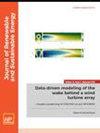考虑风速和平台运动的改进无模型自适应控制
IF 1.9
4区 工程技术
Q4 ENERGY & FUELS
引用次数: 1
摘要
针对浮式海上风力发电机(FOWT)控制中建模繁琐、扰动大的问题,提出了一种同时考虑风速扰动和浮式平台运动对波浪扰动响应的改进无模型自适应控制(MFAC)策略。在该策略中,避免了FOWT的详细数学模型,并基于改进的MFAC设计了反馈控制器,仅使用输入-输出数据来动态线性化FOWT。由随机风和浮动平台对波浪的运动响应引起的强扰动由前馈控制器补偿。使用FAST对所提出的方法和包括基线控制器在内的比较方法在不同风况下进行了仿真。结果表明,该控制器能更平稳、更接近额定值地调节发电机转速,更有效地抑制浮式平台的运动,并能显著提高FOWT的性能。本文章由计算机程序翻译,如有差异,请以英文原文为准。
Improved model-free adaptive control considering wind speed and platform motion for floating offshore wind turbines
To cope with the problems of cumbersome modeling and strongly disturbances in the control of floating offshore wind turbines (FOWTs), an improved model-free adaptive control (MFAC) strategy considering both wind speed disturbance and floating platform motion response to wave disturbance is proposed. In this strategy, a detailed mathematical model of the FOWT is avoided and the feedback controller is designed based on improved MFAC using only the input–output data to dynamically linearize the FOWT. Strongly disturbances caused by random wind and floating platform motion response to wave are compensated by a feedforward controller. The proposed method and the comparison method including the baseline controller are simulated under different wind scenarios using FAST. The results show that the proposed controller regulates the generator speed more smoothly and closer to the rated value, suppresses the motion of the floating platform more effectively, and can significantly improve the performance of FOWTs.
求助全文
通过发布文献求助,成功后即可免费获取论文全文。
去求助
来源期刊

Journal of Renewable and Sustainable Energy
ENERGY & FUELS-ENERGY & FUELS
CiteScore
4.30
自引率
12.00%
发文量
122
审稿时长
4.2 months
期刊介绍:
The Journal of Renewable and Sustainable Energy (JRSE) is an interdisciplinary, peer-reviewed journal covering all areas of renewable and sustainable energy relevant to the physical science and engineering communities. The interdisciplinary approach of the publication ensures that the editors draw from researchers worldwide in a diverse range of fields.
Topics covered include:
Renewable energy economics and policy
Renewable energy resource assessment
Solar energy: photovoltaics, solar thermal energy, solar energy for fuels
Wind energy: wind farms, rotors and blades, on- and offshore wind conditions, aerodynamics, fluid dynamics
Bioenergy: biofuels, biomass conversion, artificial photosynthesis
Distributed energy generation: rooftop PV, distributed fuel cells, distributed wind, micro-hydrogen power generation
Power distribution & systems modeling: power electronics and controls, smart grid
Energy efficient buildings: smart windows, PV, wind, power management
Energy conversion: flexoelectric, piezoelectric, thermoelectric, other technologies
Energy storage: batteries, supercapacitors, hydrogen storage, other fuels
Fuel cells: proton exchange membrane cells, solid oxide cells, hybrid fuel cells, other
Marine and hydroelectric energy: dams, tides, waves, other
Transportation: alternative vehicle technologies, plug-in technologies, other
Geothermal energy
 求助内容:
求助内容: 应助结果提醒方式:
应助结果提醒方式:


